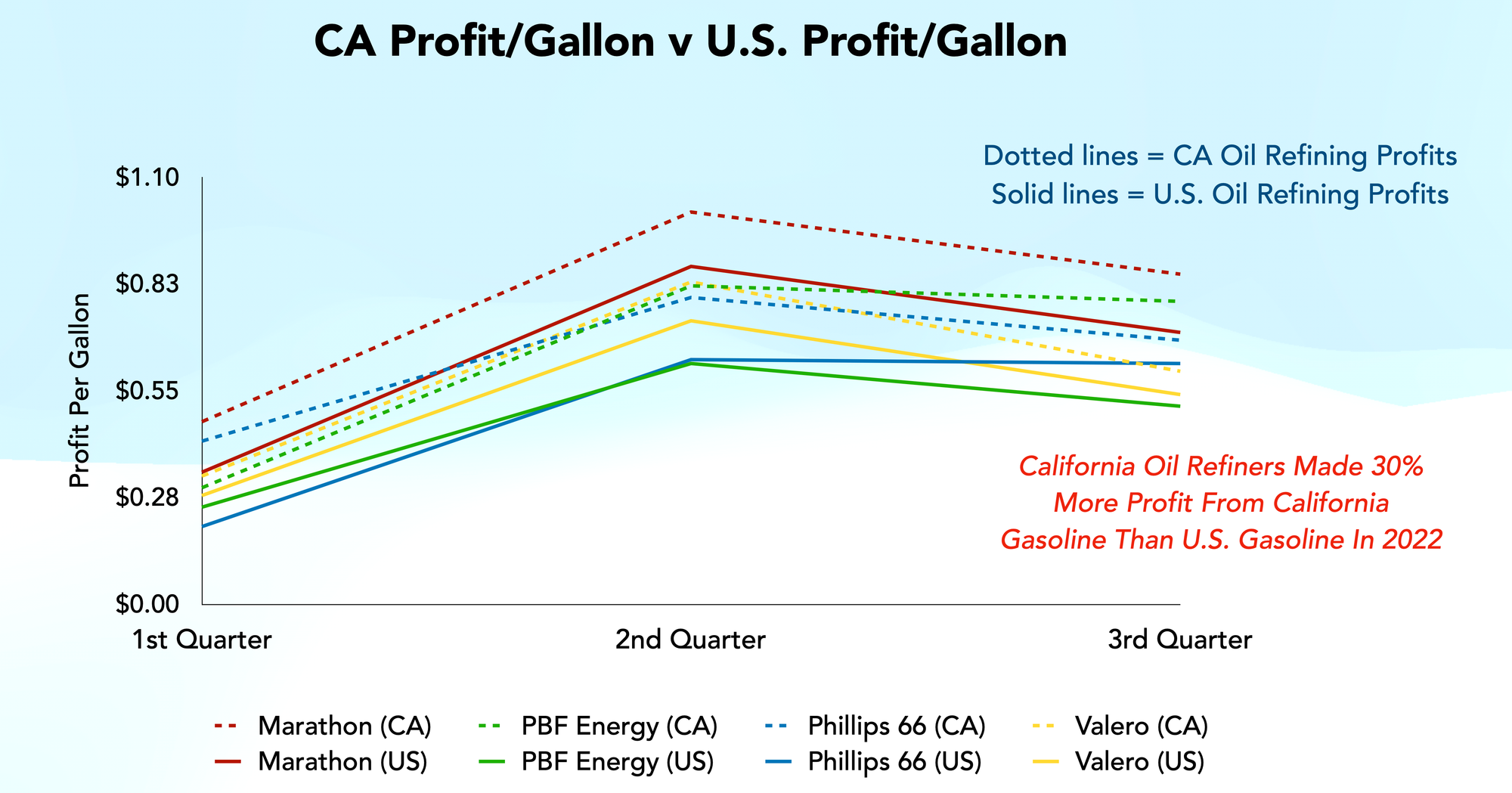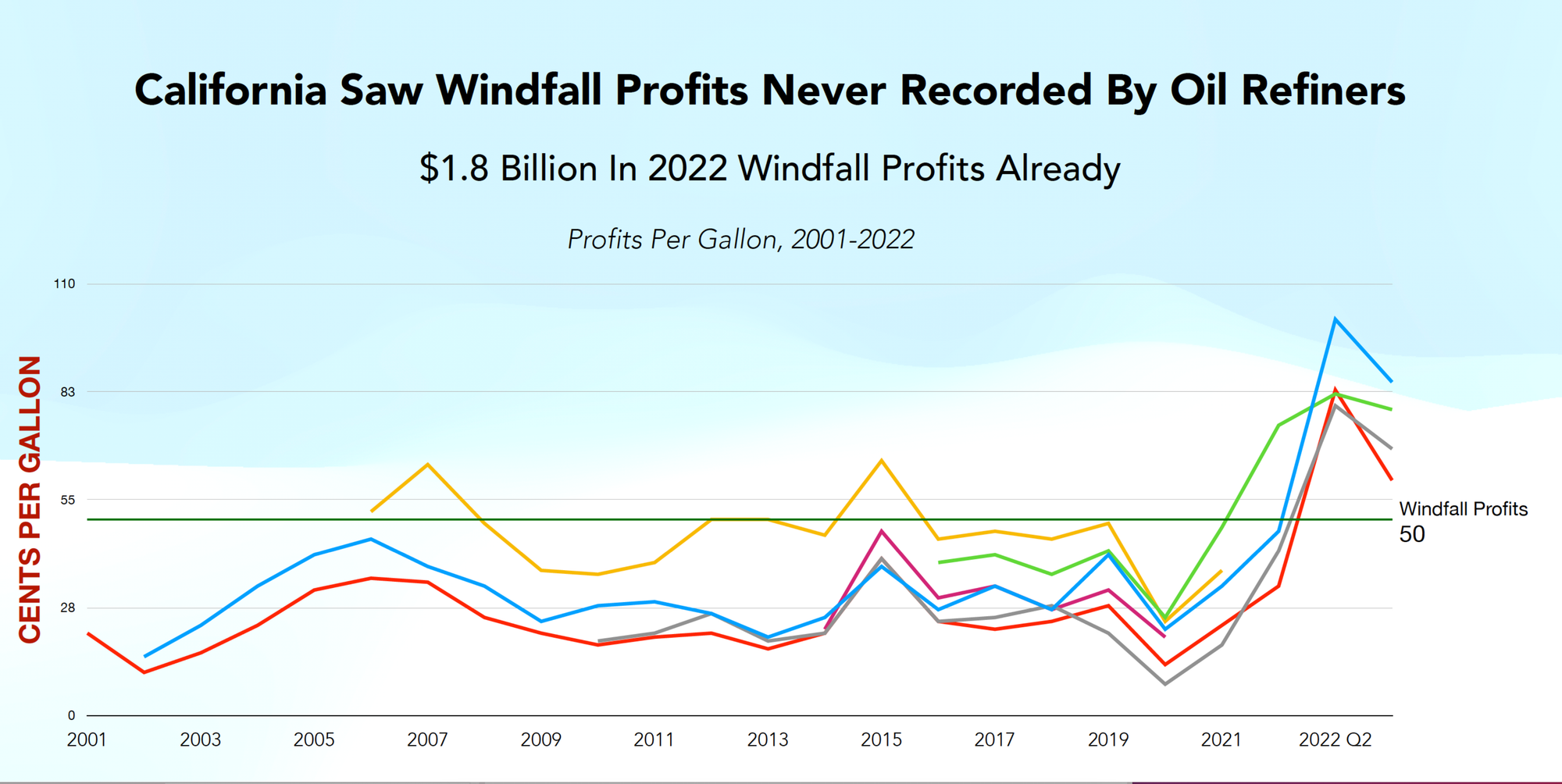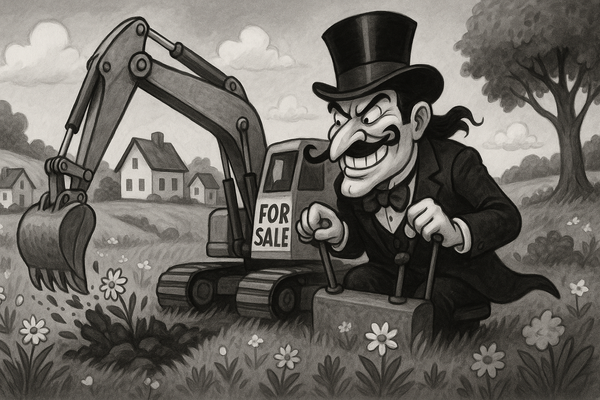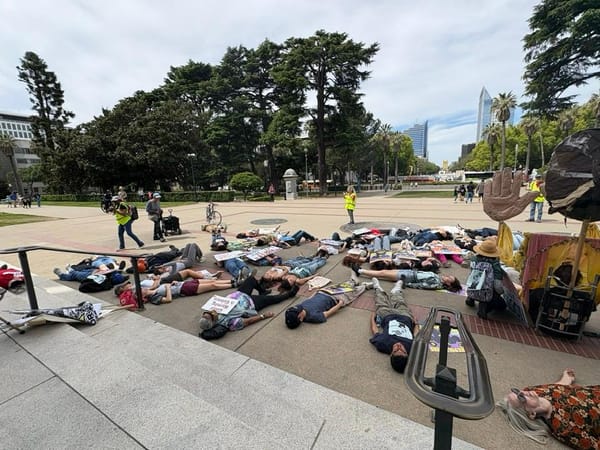Governor Newsom convenes special session to pass ‘price gouging penalty’ on oil companies
SACRAMENTO – On Nov. 30, Governor Gavin Newsom signed a proclamation to convene a special session of the California Legislature to pass a price gouging penalty on oil companies that he said “ keep money in Californians’ pockets.”
The special session is scheduled to begin Monday, December 5 at the State Capitol in Sacramento, but no further details were available at this time.
The Governor’s action follows a state hearing conducted by the California Energy Commission the day before to investigate this fall’s unprecedented spike in gasoline prices, according to a statement from the Governor’s Office. This spike in gasoline prices resulted in record refiner profits of $63 billion in just 90 days, disproportionately affecting low- and middle-income families.
Five seats remained empty that day inside the hearing room inside the California Energy Commission building in Sacramento. Nameplates at each seat represented the state’s five major oil refiners — Chevron, Valero, Phillips 66, PBF Energy and Marathon.
Those five major oil refiners refused to attend the hearing after being invited. But Catherine Reheis-Boyd, President and CEO of the Western States Petroleum Association and former Chair of the privately-funded Marine Life Protection Act (MLPA) Initiative Blue Ribbon Task Force to create “marine protected areas” in Southern California, testified on behalf of the oil industry at the hearing.
“Big oil is ripping Californians off, and the deafening silence from the industry yesterday is the latest proof that a price gouging penalty is needed to hold them accountable for profiteering at the expense of California families,” said Governor Newsom. “I’m calling a special session of the Legislature to do just that, and to increase transparency on pricing and protect Californians from outrageous price spikes in the future.”
Reheis-Boyd disagreed with Newsom’s contention that the oil industry was “profiteering.”
Due to state policies that she said have resulted in an isolated gas market and limited refinery capacity, “I’m just amazed that we’re all surprised this has an impact on cost,” said Reheis-Boyd, according to Cal Matters on Nov. 30.
“You cannot tax your way out of this problem,” she claimed according to Politico. “The only result of a windfall profit tax will make the problem worse.” https://politi.co/3ufbPqO

However, Newsom noted that this fall’s spike occurred while crude oil prices dropped, state taxes and fees remained unchanged and gas prices did not increase outside the western U.S, so the high prices went “straight to the industry’s bottom line.”
The text of the Governor’s proclamation convening a special session can be found here.
During the special session, Newsom said the Legislature will also consider efforts to empower state agencies to “more closely review gas costs, profits and pricing as well provide the state with greater regulatory oversight of the refining, distribution and retailing segments of the gasoline market in California.”
“Taking action to lower prices at the pump, Governor Newsom in September ordered the switch to winter-blend gasoline and demanded accountability from oil companies and refiners that do business in California. Since California’s record-high gas prices of $6.42, the Governor’s actions have reduced those prices to $4.95 most recently – a decrease of $1.47 since the peak,” the statement said.
In the third quarter of 2022, from July to September, oil companies reported record high profits:
- Phillips 66 profits jumped to $5.4 billion, a 1243% increase over last year’s $402 million;
- BP posted $8.2 billion in profits, its second-highest on record, with $2.5 billion going toward share buybacks that benefit Wall Street investors;
- Marathon Petroleum profits rose to $4.48 billion, a 545% increase over last year’s $694 million;
- Valero’s $2.82 billion in profits that were 500% higher than the year before;
- PBF Energy’s $1.06 billion that was 1700% higher than the year before;
- Shell reported a $9.45 billion haul that sent $4 billion to shareholders for stock buybacks;
- Exxon reported their highest-ever $19.7 billion in profits;
- Chevron reported $11.2 billion in profits, their second-highest quarterly profit ever.
Oil refiners more than doubled their CA profits from recent gas price spikes, watchdog testifies
According to testimony delivered by Consumer Watchdog to the California Energy Commission on Nov. 29 during the CEC hearing, California’s four big oil refiners more than doubled their average profit of the last 20 years from California during the recent gasoline price spikes.
Consumer Watchdog also revealed that the four oil refiners that report quarterly profits to their investors reported 30% greater profits from California during 2022 than from anywhere else in the nation or world, according to a news release from the group.
View the group’s presentation on windfall profits.

“Californians are being punished with gasoline prices that were as much as $2.60 more than US gas prices and the proof of the price gouging is in the profits reports,” said Jamie Court, president of Consumer Watchdog. “California oil refiners reported truly windfall profits in 2022, profits levels they have never reached in the last 20 years. It’s time for the state to set a windfall profits cap on oil refiners so that the Golden State gouge comes to an end.”
Reports to investors show over the last 20 years oil refiners in California made an average of 32 cents per gallon refining gasoline, this year they more than doubled the margin to make 69 cents per gallon in profit, according to Court.
“The four refiners that report quarterly profits – Valero, PBF, Phillips 66, and Marathon – made an average of 86 cents per gallon in profit during the second quarter and 73 cents per gallon during the third quarter. Until this year, none of the four oil refiners have made profits that have exceeded 50 cents per gallon,” said Court.

Chevron only reports its profits on an annual basis, Court said. During the last 20 years, Chevron has made profits per gallon in California that have exceeded 50 cents per gallon only 3 times.
Counting any profit above 50 cents per gallon as a windfall profit, the four refiners that report their quarterly profit would owe Californians back $1.8 billion for their windfall profits in the first three quarters of 2022, Court testified.
Court noted that California’s big five oil refiners posted overall profits of $67.6 billion in the first nine months of 2022 – nearly quadruple the $17.6 billion recorded for the same period in 2021. The five refiners — Chevron, Marathon, PBF, Phillips 66 and Valero — make 97% of the gasoline in California.
“Californians have paid billions too much at the pump due to oil refiners’ price gouging,” said Court. “Now it’s time for the California legislature to take up Governor Newsom’s call for a windfall profits cap during the special session and give them much needed relief.”
WSPA President claims oil industry is being ‘demonized’
In response to Newsom’s call for a special session to support a price gouging penalty on oil companies, WSPA President Reheis-Boyd claims that the oil industry is being “demonized”
“No one wants high energy costs, or the global market we have now that creates them. But, demonizing the oil industry must stop,” she said in a recent statement.
“What the Governor should do is promote an all of the above energy strategy and end his own policies that reduce oil supply and discourage investment in refining capacity and infrastructure. These are the actions that create market uncertainties and higher costs to consumers,” Reheis-Boyd concluded: ttps://www.wspa.org/resource/wspa-president-ceo-response-to-governor-newsoms-statement-on-oil-industry-profits/
A tug of war between Big Oil and the people of California
Before the hearing on Big Oil windfall profits, members of the Last Chance Alliance, Oil and Gas Network and local climate justice groups held a protest in front of the California Energy Commission building from 12 noon to 1 pm.
The event included songs, chants and street theatre depicting a tug of war between oil industry executives and green elves, representing the children and working families that have been impacted by Big Oil’s greed in price gouging in California during this holiday season
The elves, arrayed in bright green outfits, won in the tug of war against Big Oil honchos.
Will the people of California also win the battle against the oil industry in the upcoming special session? Stay tuned.
Background: Gusher of oil industry money has fouled California politics
Flush with billions of dollars in profits, the oil and gas companies have a huge war chest to draw from in their battle to stop a price gouging penalty on oil companies from becoming a reality.
Oil and gas drillers have spent $9.2 million to date to gather signatures for a ballot referendum to overturn SB 1137, a new law to mandate 3200 foot setbacks between oil and gas operations and homes, schools, hospitals and other facilities.
And this is just part of the gusher of money spent by the oil and gas industry on campaigns and lobbying in 2022 to date.
The biggest sources of outside spending in legislative races in the November 2022 election cycle were oil and gas companies and electric utilities, according to Ben Christopher and Sameea Kamal of Cal Matters.
“Those organizations have spent more than $7.6 million, roughly one-fifth of the total. Most of that spending happened before Newsom announced a December special legislative session on his oil tax plan.”
In a huge story broken by this reporter, the oil and gas industry has spent an astounding $30 million in the 2021-22 Legislative Session against SB 1137 and other bills it was opposed to.
Big Oil and the Western States Petroleum Association (WSPA) spent $4,573,758 in lobbying expenses from September 1 to October 31, 2022. That brings the total of oil and gas corporation lobbying expenses to $30,029,638 in the last seven quarters of the 2021-22 Legislative Session:cal-access.sos.ca.gov/…
The Western States Petroleum Association spent $2,164,966.81of that $4,573,758 in lobbying expenses in the seventh quarter of the legislative session. That brings the total of the lobbying expenses by WSPA alone to $23 million in the 2021-22 session!
While environmental justice groups, with the help of Governor Gavin Newsom, were able to finally get SB 1137 approved, other important bills, including a bill to ban offshore drilling off the California coast and another bill to divest State of California pension funds from investments in the fossil fuel industry, were stopped by oil industry-backed legislators.
“The oil and gas industry knows no bounds when it comes to putting profits over people and subverting the democratic process,” said Brandon Dawson, Sierra Club California Director. “California frontline communities have been fighting for protections from toxic oil and gas pollution for decades, and the setbacks mandated by SB 1137 will go a long way towards preserving those communities’ air quality and ecosystems.”
Big Oil has been able to get away with what it does in California for decades because of the enormous influence the Western States Petroleum Association, the trade group for the oil industry, and oil and gas companies, has exerted over the California Legislature, regulatory agencies and media.
WSPA, the largest and most powerful corporate lobbying group in Sacramento, alone has spent over $23 million lobbying the California Legislature and other state officials in the 2021-22 session, including $2,164,966.81 from June 1 through September 30, 2022.
Over the past four years, fossil fuel companies paid almost $77.5 million to lobby lawmakers in Sacramento, reported Josh Slowiczek in Capital and Main on May 14.
“Oil and gas interests spent four times as much as environmental advocacy groups and almost six times as much as clean energy firms on lobbying efforts in California between 2018 and 2021, according to a Capital & Main analysis — reflecting the intensity of the industry’s efforts to influence policy in a state whose leaders have vowed to build an energy future free of fossil fuels,” Slowiczek wrote.
WSPA and Big Oil wield their power in 8 major ways: through (1) lobbying; (2) campaign spending; (3) serving on and putting shills on regulatory panels; (4) creating Astroturf groups; (5) working in collaboration with media; (6) creating alliances with labor unions; (7) contributing to non profit organizations; and (8) sponsoring awards ceremonies, including those for legislators and journalists.



